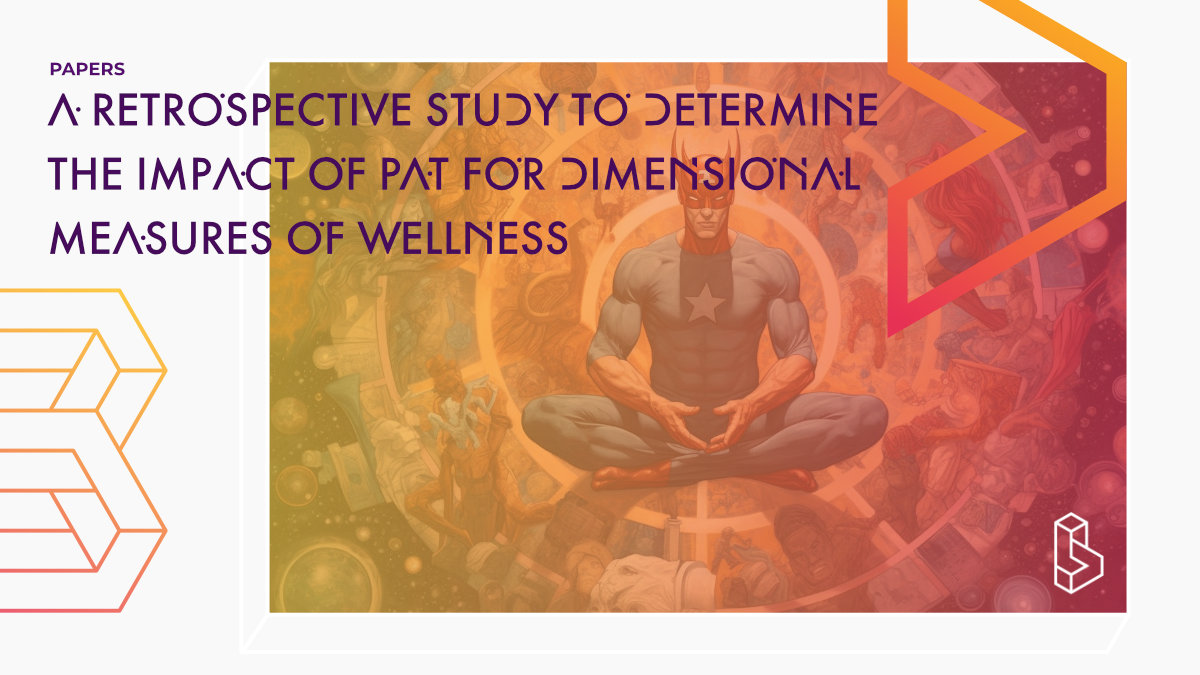This pre-print of an observational study (n=65) examines the impact of psychedelic medicines on wellness among civilian or military veterans who self-identified as using these substances for non-recreational purposes in the past three years. Participants reported improvements in all domains (pain, mental health, function, and overall quality of life), with the highest perceived improvement in mental health and overall quality of life, and lowest in pain. The results suggest a significant association between the perceived changes in all domains, regardless of the specific psychedelic substance used.
Abstact of A Retrospective Study to Determine the Impact of Psychedelic Therapy for Dimensional Measures of Wellness
“Background: The World Health Organization (WHO) defines wellness as the optimal state of health of individuals and groups. No study to date has identified the impact of psychedelic medicines on optimizing wellness using a dimensional approach. Using this approach, treatment effects can be measured more broadly using a composite score of participants global perceptions of change for pain, function, and mood scores. Given the precedence in previous work for retrospective studies of participants self-medicating with these substances, the nature of this study design allows for a safe way to develop further evidence in this area of care, with wellness as the broad indication.
Methods: 65 civilian or military veterans above the age of 18, self-identifying as having used psychedelic medicines for non-recreational purposes in the last 3 years were recruited. Participants completed the following standardized questionnaires: Patient Global Impression of Change (PGIC) scale, Pain, Enjoyment of Life and General Activity (PEG) scale, Anxiety and Depression scale (ADS), and Disability Index (DI) scale. The analysis focused on reported PGIC outcomes and correlations between subscales. Given the nature of the study, a comparison to the baseline could not be made.
Results: On average, participants reported improvement in all domains (pain, mental health, function, and overall quality of life), regardless of the medicine. Perceived improvement was highest in mental health and overall quality of life, and lowest in pain. Kendall correlation showed a highly significant association between the perceived changes in all domains. Correlation coefficients were highest between the perceived change in function, quality of life, and mental health. Discussion: The use of various psychedelic medicines may be associated with a broad range of changes that could help clarify the mechanism of how they impact wellness in the future. Pain, mental health, function, and overall quality of life accordingly improved after the use of these medicines. Minor differences between the drugs were not found as significant, indicating that the perceived benefits seemed to be specific to the psychedelic class. Numerous limitations exist to this type of study which was relatively small in size, retrospective and anonymous in nature.
Conclusion: The wellness of individuals or groups is not simply an absence of disease, symptoms, or impairments. Instead, it is an outcome that is shaped by a myriad of personal characteristics, psychophysiology, and choices, expressed throughout ones lifespan, unfolding in dynamic interaction with a complicated sociocultural and physical environment.“
Authors: Victoria Di Virgilio, Amir Minerbi, Jagpaul K. Deol, Salena Aggerwal, Toufik Safi & Gaurav Gupta
Summary of A Retrospective Study to Determine the Impact of Psychedelic Therapy for Dimensional Measures of Wellness
The World Health Organization (WHO) defines health as the complete physical, mental, and social well-being of an individual, which includes the ability to handle everyday challenges, function effectively, and give back to the community.
Research shows that the Diagnostic and Statistical Manuals (DSM) guidelines are not extremely specific, inter-rater reliability is low, and treatment outcomes are not always correlated with clinical indicators. Therefore, many authors advocate for a dimensional approach to mental health treatment.
Find this paper
https://doi.org/10.1101/2023.05.10.23289787
Open Access | Google Scholar | Backup | 🕊
Cite this paper (APA)
Di Virgilio, V., Minerbi, A., Deol, J. K., Aggerwal, S., Safi, T. & Gupta, G. (2023). A Retrospective Study to Determine the Impact of Psychedelic Therapy for Dimensional Measures of Wellness: A Quantitative Analysis of Response Data. medRxiv, 2023-05.
Study details
Participants
65
Humans
Linked Research Papers
Notable research papers that build on or are influenced by this paper
A Retrospective Study to Determine the Impact of Psychedelic Therapy for Dimensional Measures of Wellness: A Qualitative Analysis of Response DataThis preprint qualitative analysis (n=65) of civilians and veterans finds improvements in wellness (a term used by the WHO), which includes improvements in medical and mental health conditions, social interactions, spirituality, and overall function.

